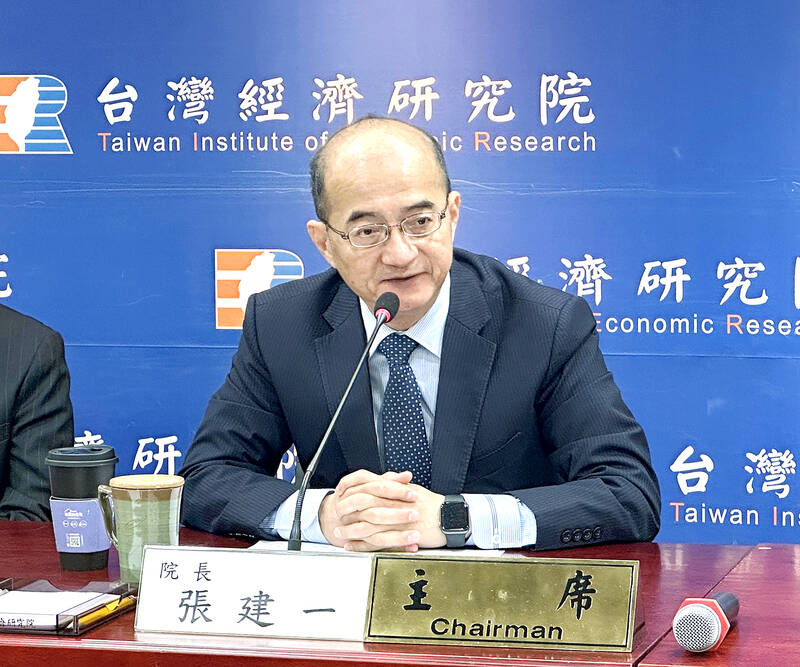The Taiwan Institute of Economic Research (TIER) yesterday cut its GDP growth forecast for Taiwan from 3.42 percent to 2.91 percent this year, as the nation’s economy is bracing for a bumpy ride amid mounting global uncertainties and US trade policy swings.
It pinned the downgrade chiefly on US President Donald Trump’s unpredictable trade policy stances, after his April 2 announcement of sweeping “reciprocal” tariffs sent shockwaves through global supply chains, only to be postponed a week later by 90 days.
“No one can confidently predict the final shape or impact of Trump’s tariffs,” TIER president Chang Chien-yi (張建一) said.

Photo: CNA
The forecast only factored in the universal 10 percent tariff and the possible drag from a slowing global economy, he said.
TIER economist Gordon Sun (孫明德) said that rush orders and front-loading by firms at home and abroad to deal with future tariffs bolstered exports last quarter, despite weak seasonality.
Sun said he doubted front-loading demand is sustainable, adding that it might dampen the demand during the high season in the second half of the year.
Taiwan’s first-quarter economic numbers were impressive, thanks in part to robust demand for electronics used in artificial intelligence (AI)-related technologies, government data showed.
“However, the momentum would prove short-lived,” Sun said.
Furthermore, consumer and investment confidence has started to fall, as global stock markets falter and volatility deepens, the economist said.
Corporations would exercise caution in spending and expansion plans, he said.
Against that backdrop, TIER slashed its private investment growth forecast by 1.56 percentage points to 4.10 percent for this year, while private consumption is expected to rise a mild 1.97 percent, down 0.14 percentage points from the earlier estimate, the institute said.
Taiwan’s export-oriented economy would slow down quarter by quarter, Sun said.
Adding to the headwinds are growing doubts over whether the AI boom can be sustained, after being the growth driver for the past two years, Sun said.
US tech giants are reportedly scaling back AI investment plans, which is unfavorable for Taiwanese firms on their supply chains.
The US is also mulling semiconductor tariffs and tightening restrictions on advanced chip exports to China, moves that could hit Taiwanese chipmakers and server suppliers hard, he said.
Clouds are gathering, with the manufacturing climate index last month falling to 95.0, TIER said, citing a monthly sentiment survey.
The percentage of manufacturers with optimistic views for the next six months dropped from 35.1 percent in February to 19.7 percent last month, while those with pessimistic views nearly tripled to 29.8 percent, it said.
The service sector’s confidence reading declined for the third consecutive month to 88.51, as the stock rout caused a negative wealth effect and drove investors to the sidelines, the institute said.
Even construction firms, a sector buoyed by public infrastructure projects, were not immune, it said.
The industry’s climate index slipped 7.35 points to 94.34, weighed by local share price corrections and the central bank’s lingering credit controls, it said.

DIVIDED VIEWS: Although the Fed agreed on holding rates steady, some officials see no rate cuts for this year, while 10 policymakers foresee two or more cuts There are a lot of unknowns about the outlook for the economy and interest rates, but US Federal Reserve Chair Jerome Powell signaled at least one thing seems certain: Higher prices are coming. Fed policymakers voted unanimously to hold interest rates steady at a range of 4.25 percent to 4.50 percent for a fourth straight meeting on Wednesday, as they await clarity on whether tariffs would leave a one-time or more lasting mark on inflation. Powell said it is still unclear how much of the bill would fall on the shoulders of consumers, but he expects to learn more about tariffs

NOT JUSTIFIED: The bank’s governor said there would only be a rate cut if inflation falls below 1.5% and economic conditions deteriorate, which have not been detected The central bank yesterday kept its key interest rates unchanged for a fifth consecutive quarter, aligning with market expectations, while slightly lowering its inflation outlook amid signs of cooling price pressures. The move came after the US Federal Reserve held rates steady overnight, despite pressure from US President Donald Trump to cut borrowing costs. Central bank board members unanimously voted to maintain the discount rate at 2 percent, the secured loan rate at 2.375 percent and the overnight lending rate at 4.25 percent. “We consider the policy decision appropriate, although it suggests tightening leaning after factoring in slackening inflation and stable GDP growth,”

Greek tourism student Katerina quit within a month of starting work at a five-star hotel in Halkidiki, one of the country’s top destinations, because she said conditions were so dire. Beyond the bad pay, the 22-year-old said that her working and living conditions were “miserable and unacceptable.” Millions holiday in Greece every year, but its vital tourism industry is finding it harder and harder to recruit Greeks to look after them. “I was asked to work in any department of the hotel where there was a need, from service to cleaning,” said Katerina, a tourism and marketing student, who would

i Gasoline and diesel prices at fuel stations are this week to rise NT$0.1 per liter, as tensions in the Middle East pushed crude oil prices higher last week, CPC Corp, Taiwan (台灣中油) and Formosa Petrochemical Corp (台塑石化) said yesterday. International crude oil prices last week rose for the third consecutive week due to an escalating conflict between Israel and Iran, as the market is concerned that the situation in the Middle East might affect crude oil supply, CPC and Formosa said in separate statements. Front-month Brent crude oil futures — the international oil benchmark — rose 3.75 percent to settle at US$77.01